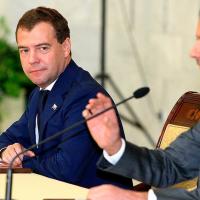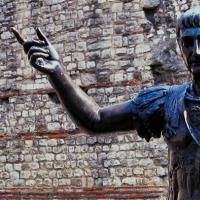Obituary for Ludwig van Beethoven
Biography and episodes of life Ludwig van Beethoven. When born and died Ludwig van Beethoven, memorable places and dates of important events in his life. composer quotes, Photo and video.
Ludwig van Beethoven's years of life:
born December 16, 1770, died March 26, 1827
Epitaph
“On the very day when your consonances
Overcome the difficult world of work,
The light overpowered the light, the cloud passed through the cloud,
Thunder moved on thunder, a star entered the star.
And furiously seized by inspiration,
In the orchestras of thunderstorms and the thrill of thunders,
You climbed the cloudy steps
And touched the music of the worlds.
From a poem by Nikolai Zabolotsky dedicated to Beethoven
Biography
His own father did not see the talent in him, and Haydn considered him too gloomy a composer, but when Beethoven died, twenty thousand people followed his coffin. The last years of his life, the composer was absolutely deaf, but this did not prevent him from creating his most brilliant works at that time. Perhaps Beethoven really was not mistaken when he said that he was creating with God's help.
Ludwig van Beethoven was born into a musical family. From childhood, his father worked with the boy and taught him to play various musical instruments. But the first performance of little Beethoven was without much success, and his father decided that he had no talent, and entrusted his son to other teachers. Beethoven, contrary to the disappointing forecasts of his father, already at the age of 12 received the position of assistant organist at court. And when his mother died, he took over the duties of the breadwinner and supported his younger brothers, working in the orchestra.
Beethoven's first fame was brought not by his own compositions, but by his virtuoso performance. Soon the works of Beethoven himself began to be published. Especially successful for the composer was the period of Beethoven's life, which he lived in Vienna. Despite the fact that the composer had a rather sharp temper, high conceit, refused to bow before ranks and influential people, it was impossible not to recognize the genius of Beethoven. And yet the composer always had many friends - tough and proud in public, he was very generous and friendly towards his loved ones, ready to give them the last money or help in solving problems.
But Beethoven's main passion was music. Perhaps that is why he never married, he was so passionate about himself and his ability to create. Only illness could prevent him from composing, and therefore it seems like an evil irony that the brilliant composer began to lose his hearing at such a young age. But even this did not stop him, and his music became even more perfect and monumental.
The last years of his life, Beethoven worked with particular zeal, creating one great work after another. But illness and worries about the nephew, whom Beethoven took in, significantly shortened his life. Beethoven's death came on March 26, 1827. Beethoven's funeral was held with great honors. Beethoven's grave is located in Vienna's Central Cemetery.

life line
December 16, 1770 Date of birth of Ludwig van Beethoven.
1778 Beethoven's first public performance in Cologne.
1780 Beginning of classes with organist and composer Christian Gottlob Nefe.
1782 Admission to the position of assistant to the court organist, publication of the first work of the young composer - variations on the theme of Dressler's march.
1787 Admission to the position of violist in the orchestra.
1789 Attending lectures at the university.
1792-1802 The Vienna period in Beethoven's life - classes with Haydn, Salieri, Beethoven's fame as a virtuoso performer, the publication of Beethoven's works.
1796 The onset of hearing loss.
1801 Beethoven's "Moonlight Sonata"
1803 Beethoven writing the Kreutzer Sonata.
1814 Staging of Beethoven's only opera Fidelio.
1824 Performance of Beethoven's Symphony No. 9.
March 26, 1827 Date of Beethoven's death.
March 29, 1827 Beethoven's funeral.
Memorable places
1. Beethoven's house in Bonn, where he was born.
2. Beethoven's house-museum in Baden, where he lived and worked.
3. Theater An der Wien ("Theater on the River Vienna"), which premiered such works by Beethoven as the opera "Fidelio", the Second, Third, Fifth and Sixth Symphonies, the Violin and the Fourth Piano Concertos.
4. A memorial plaque to Beethoven on the house "At the Golden Unicorn" in Prague, where the composer stayed.
5. Monument to Beethoven in Bucharest.
6. Monument to Beethoven, Haydn and Mozart in Berlin.
7. Vienna Central Cemetery, where Beethoven is buried.
Episodes of life
Like Bach, Beethoven was sure that there was a divine element in his music. But if Bach believed that his talent was the merit of God, then Beethoven claimed that he communicated with God while writing music. It is known that he had a slightly arrogant character. One day, a musician complained about a difficult and uncomfortable passage in Beethoven's work, to which the composer replied indignantly: "When I wrote this, the Lord Almighty guided me, do you really think that I could think of your little part when He spoke to me?"
Beethoven had many oddities. For example, before starting to compose music, Beethoven dipped his head into a container of ice water, and at moments when difficulty arose in work, he began to pour water on his hands. Very often he walked around the house in wet clothes, without even noticing it and immersed in his thoughts. Beethoven's neighbors often complained about water pouring from the ceiling.
Once Beethoven was walking with the German poet Hermann Goethe, and he was indignant that he was tired of the endless greetings of passers-by. To which Beethoven condescendingly replied: “Don't let that bother you, Your Excellency. Perhaps the greetings are meant for me."

Covenant
"People make their own destiny!"
Biography of Ludwig van Beethoven in the Encyclopedia project
condolences
"Haydn and Mozart, the creators of new instrumental music, were the first to show us art in its unprecedented splendor, but only Beethoven peered into it with great love and penetrated into its essence."
Ernst Theodor Amadeus Hoffmann, writer, composer, artist
"The true reason for the success of Beethoven's music is that people study it not in concert halls, but at home, at the piano..."
Richard Wagner, composer
"Before the name of Beethoven, we must all bow in obeisance."
Giuseppe Fortunino Francesco Verdi, composer


